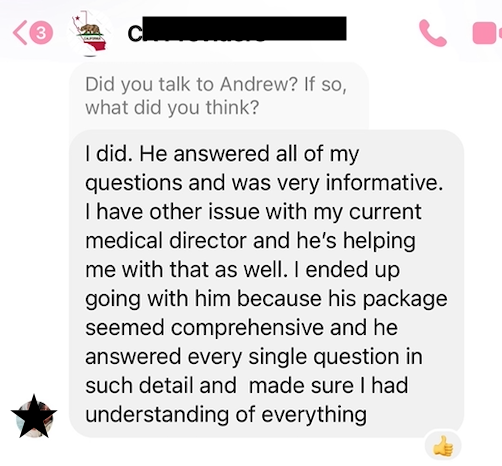- Mon-Fri 9am-5pm
- 8549 Wilshire Blvd #2101, Beverly Hills, CA 90211
Follow us on :
Follow us on :
The MSO (Management Services Organization) Model is a widely utilized legal structure that allows non-clinicians and business entities—such as telemedicine platforms, health centers, medical spas, and other healthcare ventures—to collaborate with licensed healthcare providers, including physicians, psychologists, chiropractors, and behavioral health specialists.
This model is critical for navigating the complex regulatory environment of healthcare, particularly the Corporate Practice of Medicine (CPM) doctrine and prohibitions against fee-splitting or kickbacks. These laws are designed to ensure that clinical decisions remain under the control of licensed professionals rather than being influenced by business interests. Even in states with more lenient CPM rules, enforcement authorities scrutinize whether a business unduly interferes with clinical autonomy.
Our firm specializes in helping healthcare entrepreneurs and businesses design MSO structures that meet their operational and financial goals while mitigating legal and compliance risks. Whether you’re launching a new telemedicine platform, expanding your medical spa, or scaling your functional medicine practice, we provide customized legal guidance to ensure compliance with CPM, fee-splitting laws, and other regulatory requirements.
Over the years, we’ve worked with many startups and established companies, tailoring MSO agreements and other legal strategies to empower healthcare businesses to thrive. We’re passionate about helping ventures like yours successfully launch, grow, and scale in the highly regulated healthcare sector.
The Management Services Organization (MSO) Model is a popular legal structure used by healthcare businesses to reduce the risk of violating laws surrounding the Corporate Practice of Medicine (CPM) and fee-splitting or kickback prohibitions. These laws aim to ensure that licensed healthcare providers retain control over clinical decisions, free from undue influence by non-clinicians or business entities.
The core concept of the MSO Model is a clear division of roles: the licensed healthcare provider—such as a physician, chiropractor, acupuncturist, nutritionist, dietitian, physical therapist, or psychologist—focuses exclusively on the clinical aspects of patient care, while the MSO manages the administrative, operational, and business-related tasks. This includes functions like scheduling, billing, marketing, staffing, and general business operations, ensuring the provider remains compliant with healthcare regulations while allowing the business to operate efficiently.
What qualifies your entity as a Professional Corporation (PC) or Professional Limited Liability Company (PLLC)?
To qualify as a Professional Corporation (PC) or, in certain states, a Professional Limited Liability Company (PLLC), your business entity must be formed explicitly for the purpose of providing licensed professional services, such as medicine, psychology, chiropractic, nursing, or dentistry. This requirement is typically outlined in the Articles of Incorporation, where the professional purpose of the entity must be clearly stated.
As a general rule, only a Professional Corporation (PC) or PLLC can provide licensed professional services. General corporations (C-Corp, S-Corp) or standard LLCs are not permitted to offer such services under most state laws. If you plan to practice medicine or another licensed healthcare profession, it is essential to organize your entity as a PC or PLLC (in states like New York, which allow PLLCs for professional services). This ensures compliance with state-specific regulations governing the delivery of professional healthcare services.

The MSO Model can be especially useful if you’re creating:
The great advantage of the MSO (Management Services Organization) Model is its flexibility: anyone can own an MSO, including business professionals who are not licensed clinicians. This allows entrepreneurs and investors to play a significant role in healthcare ventures without requiring a professional license.
While clinicians can also be offered equity in the MSO, such arrangements must be carefully structured to avoid potential conflicts of interest or regulatory concerns. One of the key benefits of the MSO not being physician-owned is that it simplifies the process of selling or exiting the business, offering more opportunities for growth and scalability.

Healthcare Provider
Freedom Thru Business helped me establish my telemedicine practice while ensuring full compliance with all regulations. Their team is always accessible and provides practical, clear legal advice.

Telemedicine Entrepreneur
Working with Freedom Thru Business has been a game changer. Their expertise in healthcare law and business regulations has given me the confidence to expand my wellness center with peace of mind.

Wellness Center Owner



At Freedom Thru Business APC, we specialize in providing expert legal support for healthcare businesses. Trust us to safeguard your practice and help you navigate complex legal challenges with confidence.
Copyright 2024 Freedom Thru Business APC, All Rights Reserved.
Not Legal Advice: By entering this site you agree not to use FreedomThruBusiness.com as legal advice or representation for any purpose. The information contained on this website and our social media pages is for informational purposes only and should not be construed as legal advice. You should consult with an attorney in your state to obtain specific legal advice.
Freedom Thru Business has been an invaluable partner in helping me navigate the complex legal landscape of healthcare. Their team is knowledgeable, responsive, and truly cares about my success.